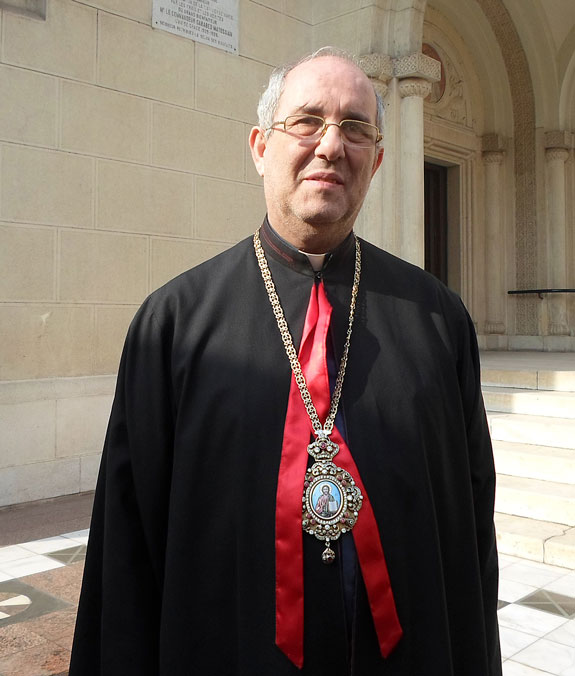by James Martone

CAIRO (CNS) – The two worlds Armenian Catholic Bishop Krikor Okostinos Coussan knows best are engulfed in violence.
In Syria, where he’s from, a war has led to the death of tens of thousands of people and displaced millions of others.
In Egypt, where he lives and currently serves, civil unrest combined with terror attacks are now killing and maiming.
Though the names of the groups responsible may vary, their goals are often the same, said Bishop Coussan, head of Egypt’s Armenian Catholic Church.
“They are all 100 percent terrorists … and they come to destroy countries and separate people and foment sectarian strife. They come to destroy … heritages and humanity, and to put hatred and contempt in people’s hearts,” said Bishop Coussan.
He said he receives daily reports of the “destruction and war” in Syria from family and friends who are there and that he is witnessing firsthand the most widespread violence Egypt has seen in modern history.
In Syria, “the governments of big nations” were backing “terrorist groups” including al-Qaida, Bishop Coussan said, without naming the nations to which he was referring.
He said the terrorists groups were “bent on installing Islamic extremist forms of rule” in the entire Middle East and that many of those now fighting against Syrian President Bashar Assad were “foreigners” and “mercenaries… paid to blow themselves up.”
“I ask the governments financing the terrorists, instead of giving money for the destruction and killing of people, to give it for the building of hospitals and schools… and toward creating businesses so our economies can flourish,” he said.
Opposition groups in Syria, some of them openly Muslim militant, have been fighting the dictatorial, secular regime of Assad in a protracted war that the U.N. says has killed at least 100,000 by last July and displaced nearly nine million others.
In Egypt, militant violence and civil unrest engulfing the country since President Mohammed Morsi’s ouster by the military last July has killed hundreds of people, according to rights groups who criticize what they say is an unwarranted crackdown on dissent by state security.
The Egyptian conflict is different from Syria’s, but the “source” for some of it “is the same,” said Bishop Coussan, who lived and served in the Syrian city of Aleppo until being appointed to Egypt 10 years ago as bishop for Armenian Catholics.
Bishop Coussan said he remained hopeful and prayed that peace talks underway in Geneva could lead to a peaceful end to the conflict in which Assad’s regime, as well as some of the groups opposing it, have been accused of massive human rights abuses.
He said Christians in Syria, as well as many Muslims, were praying for the safe release of at least 12 nuns, two bishops and two priests from Syria and an Italian Jesuit priest kidnapped over the past 12 months.
One of those missing is an Armenian Catholic priest, Father Michel Kayyal.
“There is no news of him, or the others. No demands for money. [Father Kayyal] had only just begun his priesthood, after studying in Rome. I call his parents now and then, just to encourage them, but how can you imagine what they feel,” he said.
Christians in Syria and Egypt account for about 10 percent of each of the two nations’ predominantly Muslim populations and have been recent targets in the violence there. Tens of thousands have reportedly emigrated over that past three years, as have hundreds of thousands of Iraq’s minority Christians since the 2003 fall of Saddam Hussein.
Despite the difficulties, Bishop Coussan said it was “the duty and mission” of the Middle East’s minority Christians to stay in their “homelands … for the sake of our children and their children’s children.”
“It is in the Middle East that these Christians and their ancestors have lived and if we leave the Middle East, the Middle East will be lost. And if we go to the West, we are lost, because our traditions, customs and rites will disappear,” Bishop Coussan said.
